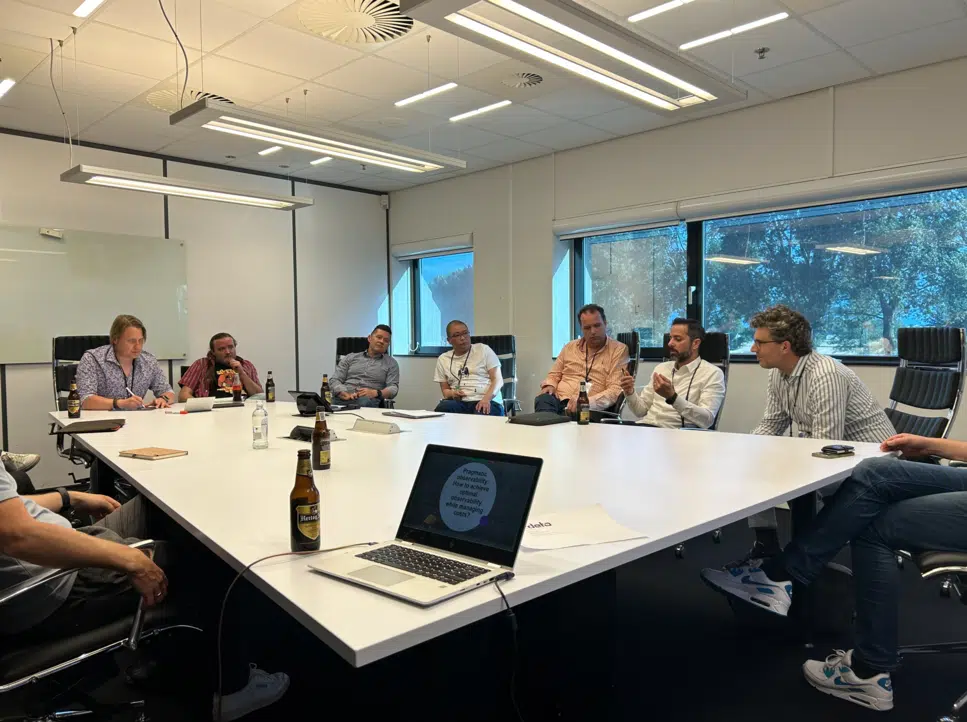We recently spoke with Amandeep Shergill, Head of Talent at Lendable as part of our #TalentQA series where we interview leaders in talent management and recruitment from a range of businesses from tech startups to well-known fashion brands.
Amandeep talks about his experience working as an in-house recruiter within startup tech firms, the changes he has seen in the behaviours of technical candidates, and discusses the biggest changes he has seen throughout his time working in the industry.
Third Republic (TR): Could you start by giving us an overview of your background and how you got to where you are today as Head of Talent at Lendable?
Amandeep Shergill (AS): I have been working in recruitment since I graduated. I started off working in agency recruitment, sourcing tech professionals. After a couple of years, I moved to in-house recruitment. I’ve been in-house for a while now and have worked for a number of companies, all within the tech sector. Most of the companies I’ve worked for have been scale up and startup businesses and that’s how I’ve ended up at Lendable.
It’s the perfect blend for me of finance, technology and strategy, as well as having that external recruitment edge to it. For me, this role is definitely the perfect blend of all my previous experience.
TR: What does your role as Head of Talent at Lendable involve?
AS: This is the first ever talent/recruitment role at Lendable. The company has gotten itself to around 50 employees all organically before now. They’ve brought me in to give the recruitment process at bit more structure. I’m starting to put in place, more of a structure around recruitment and interview processes and strategy, candidate experience and employer brand.
TR: Could you explain some of the benefits and challenges of working in talent for a startup?
AS: It’s really interesting because you see different benefits and challenges depending on where the business is at on their growth journey. For example, in some of my previous positions, they’ve had more of a structure in place around the recruitment processes, so the challenges have been more about scaling up. Whereas at Lendable, the challenge is much more about getting that structure and the right processes in place. This will effectively impact our talent attraction, assessment and eventually retention.
Working for a startup, in any position really, but specifically within a talent role, is definitely about wearing many hats and getting many things done at once. It’s all about getting systems in place and understanding what is going to work for the business that you work in. Time management is super important.
What I love about working in startup businesses is the fact that it’s so much more fast-paced. You get to be involved in so much more than you are in large corporations. There’s not a case of having to go through 10 different sign-off stages or waiting a month before getting an offer across the line.
TR: During your time in the industry have you noticed any changes to candidate behaviours?
AS: Absolutely, especially with technical talent. Before candidates used to be in a position where they were almost grateful to be given an interview. Whereas now, because the market is so competitive, you really have to make sure your business stands out in order to engage the technical talent that’s on the market. It’s just such a competitive market.
In today’s digital age, even those who are actively looking for a role are looking in different ways. The way candidates are evaluating roles has completely changed, before it was more a case of, if it was an interesting project, you’d be able to engage talent. Whereas now, candidates are definitely interested in the team they’re working and what the company is like as much as the projects they’re going to be involved with – culture is super important.
Having a really strong employer brand and EVP (Employer Value Proposition) to explain to candidates everything from, what they’re going to be doing to what the company culture is like, is becoming more and more important. Also, a real understanding of what technical talent want from a role is key. If you don’t have these things down, then you’re going to struggle to even engage candidates in an initial conversation.
TR: How do you believe businesses can best react to these changes?
AS: Businesses need to become a lot more transparent in terms of processes – how many interview stages there are, how long they can expect to wait to hear back etc. It’s really important to manage expectations early on in the process.
Really outlining what working for the company is like, the culture, benefits, diversity, project that you’re doing is definitely becoming more and more essential for candidates.
I also think it’s essential in times when the business may not be hiring, to keep that brand alive, keep attending events and conferences and just generally ensure the brand is still out there and engaging with candidates – this is specifically key for startup businesses.
TR: Have you noticed any skills gaps in the technical talent in the industry?
AS: It depends on how you see it. Looking at the tech industry, there’s definitely a shortage of skills in general out there. However, looking at it from a different angel – there are two different waves of talent. There are your more traditional engineers and now there are more and more people coming out of coding academies. These two pools of talent are coming through with different skill sets and thought processes towards engineering and coding. There’s potentially a skills gap that could arise in what these bootcamps possibly aren’t teaching grads.
TR: What sort of strategies do you adopt at Lendable in terms of attracting, engaging and securing technical talent?
AS: For me it’s about engaging all the employees in the process. It’s not just about the talent team hiring and engaging the right talent. At the end of the day, the people we’re hiring are going to be joining different teams within the business so it’s really important for us to have everyone involved. Getting the teams to help with engaging talent is key for us. Candidates want to know who they’re going to be working with.
For example, when we host meetups, there are at least four engineers in attendance. When candidates come along, they don’t want to talk to a recruiter, they want to talk to other people in their industry and learn about the team they could potentially work with in the future.
TR: What is the biggest change you have seen throughout your time in the industry?
AS: I’d say the role has definitely evolved since I started in recruitment. It’s still obviously a predominantly sales role, however, there is a lot more marketing coming into recruitment now. There are a lot more skills that recruiters need to have in today’s day and age. From what I’ve seen in more recent years, the role has become a lot more strategic and marketing focused.
TR: Looking forward, do you think the rise in digital and technology will continue to influence and alter the industry?
AS: Yes, so you could talk about this from two angels – one being the industry (tech) itself, and the other being what digital and technology is producing for recruitment. In the first instance, yes definitely. There’s going to be skills gaps left, right and centre in tech as it continues to evolve. Right now, we’re talking about virtual reality, augmented reality, self-driving and electric vehicles, AI – there are so many things going on, that the tech industry will definitely continue evolving.
From the recruitment perspective, there’s some talk out there about automating the entire beginning of the process – from writing job specs, to sourcing candidates and even setting up first interviews. I think it’s awesome, from my perspective it would cut time spent on more administrative tasks down considerably. Saying that, I think we’re still quite a way away before this kind of technology is ready to be distributed.
TR: Finally, what advice would you offer to talent professionals in order to keep up to date with the ever-evolving world of recruitment?
AS: The biggest thing that I’ve learnt is – don’t get complacent. Don’t start thinking that the way you do things is the best way and never change it. You need to keep learning, researching and networking with other recruiters. There are communities out there that are specifically designed for recruiters to share ideas, best practice, templates. Your peers are willing to share their experiences. Remember to keep self-improving and always learning about your role and industry you work in.
If you’d like to take part in our #TalentQA series or you’re looking to source technical talent, get in touch today!




